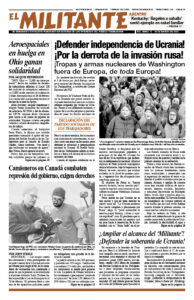MINNEAPOLIS — Since the police killing of Amir Locke Feb. 2, several protests, ranging in size from dozens to hundreds, have taken place around the Twin Cities.
Locke, a 22-year-old DoorDash driver, was killed in the early morning hours by a member of a Minneapolis police SWAT team that burst into the apartment where he was sleeping on a couch in a “no-knock” raid. He had a gun in his hand, a legal gun he bought to defend himself amid a raft of robberies of delivery people. Locke was not pointing it at anybody when a cop shot him to death nine seconds after entering the apartment. The case is under investigation. No charges have been filed.
Speakers and organizers of the actions against the killing have also spoken out on the sentencing of former police officer Kimberly Potter, who accidentally killed Daunte Wright during a traffic stop, and the trial of three former cops charged with violating the civil rights of George Floyd, who died under the knee of cop Derek Chauvin. The perspectives raised by speakers at the protests are often marked by calls for tossing aside due process rights of the accused officers to help get convictions, backing double-jeopardy state and federal trials on the same charges, as well as for long and vindictive sentences. All of these are dangers to rights working people need.
At a Feb. 20 protest calling for justice for Amir Locke, the main speakers focused on the sentencing of Kimberly Potter, which had just taken place. The protest of around 100 people was called by Black Lives Matter Minnesota and 11 other organizations. The central organizer, who did not give his name, called Potter’s sentence of two years a slap in the face. Sentencing guidelines call for a sentence of around seven years. “We want Keith Ellison,” the Democratic-party attorney general of Minnesota, “to file a petition for the resentencing of Kim Potter,” he said. Later he added, “I know that she knows the difference between a Taser and a gun. This is a cover-up.”
But for any objective observer of the body camera footage of the shooting of Wright and the immediate aftermath, it seems clear that as soon as Potter pulls the trigger firing one round into Wright’s chest, she realizes she mistakenly drew her handgun instead of her Taser. She says as much on the spot and immediately drops to the ground sobbing and is inconsolable.
Speakers at many protests have accused her of faking her emotion and remorse to cover up a heartless act of murder. One protester on TV dismissed Potter’s tearful apology to the Wright family, calling it “White tears!”
“We must continue to demand that cops who brutalize are charged and brought to trial, with punishment for those found guilty,” Gabrielle Prosser, Socialist Workers Party candidate for governor of Minnesota, told the Militant. “But we insist that all rights written into the Constitution concerning trials — due process and against cruel and unusual punishment — be applied. It is working people who are the main targets of cops and prosecutors and we need those rights.”
Minneapolis Mayor Jacob Frey is coming under increased scrutiny. On Feb. 20 the Minneapolis Star Tribune ran a front-page article entitled, “Minneapolis Mayor Frey’s credibility on police battered by false claims about reform.” Frey, reelected mayor in November 2021, ran against two challengers who were advocates of defunding the police. He tried to position himself as both a defender of the police and an advocate of police reform. He announced he was banning “no-knock” warrants in the city. The Locke killing definitively put the lie to Frey’s assertion.
Former cops Tou Thao, Alexander Kueng and Thomas Lane were found guilty in federal court for violating the civil rights of George Floyd. These are the three cops who, along with Chauvin, participated in subduing and arresting Floyd. They are also scheduled to face state charges for the same events. This example of double jeopardy, widely applauded by Black Lives Matter leaders and other organizers of protests, is another erosion of rights that workers need.
The capitalist rulers’ criminal “justice” system is organized to protect the power and prerogatives of the bosses and their government, especially against those organizing to chart a working-class road forward.

